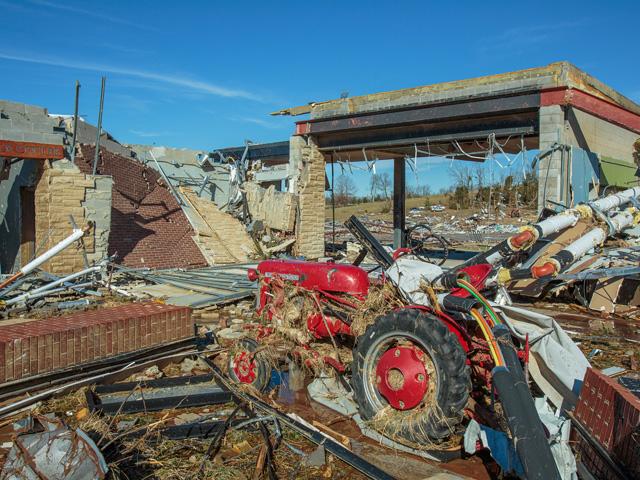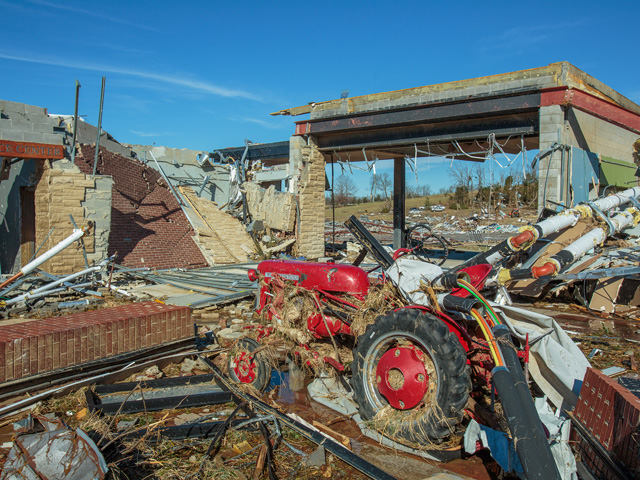Production Blog
Gathering My Chicks
Lately, I've been reminded of a saying my grandmother used when she became concerned about the whereabouts and wellbeing of family.
"I want my chicks back to roost."
Chickens roost to be safe. It's an instinct a lot of birds have. Humans aren't immune from feelings of need to draw our loved ones close either, and boy howdy have we had plenty of reasons of late.
As I listened to the winds howl on the evening of Dec. 10, I considered my immediate family members scattered across the globe. I thought about my parents as I watched the weather stations track the storm path shy of their back door. I began giving thanks for technology as texts and tweets and instant messages kept me from going all Chicken Little or Henny Penny as those winds twisted around people I know and love.
As I awakened to see photos in the aftermath of the storm, I went full mother hen. I started pinging farmers and Extension personnel. I scoured Twitter and Facebook messages for mention of other "friends" and those I've worked with over the years.
I instantly thought of the University of Kentucky Research and Education Center near Princeton, Kentucky. Chad Lee, a frequent news source for agronomy articles and all-around good egg answered my note Saturday morning, and his phone again on Monday, to confirm the center had taken a direct hit.
P[L1] D[0x0] M[300x250] OOP[F] ADUNIT[] T[]
Fortunately, staff were not at the site at the time, but those who assess disasters deemed the center a 90% loss. Read more about the damage here: https://www.dtnpf.com/….
When I turned my pen toward national agriculture news decades ago, this research center was one my first stops. Over the years, the staff has provided information for countless articles. Still, even I was surprised at the reach of this center as I read of its history of helping farmers.
Martin Industries was one of the beneficiaries of this expertise. The manufacturer of planter attachments utilized researchers at the center to help test several products, including the row-cleaner that launched the company nearly 30 years ago at the very beginnings of the no-till age.
"They played a huge role in our success," said Steve Martin, now president of the family firm, noting that the center also tested Martin-Till closing wheels and has recently consulted on other projects.
The pledge from UK to rebuild this valuable agriculture center came as a relief in this time when it is so easy to look back and yearn for what has been lost.
Hope. In this crazy time when we weigh who we hug and shake hands with, the need to hold hope closer seems critical.
And just when we were still processing the losses in states such as Arkansas, Kentucky, Missouri and Illinois, new concerns came in the form of violent winds cutting across the Plains. Pictures of young winter wheat stands decimated by blowing dirt and tales of unthinkable livestock and property losses from fire came back from queries to friends in Kansas.
Lately, Mother Nature seems determined to test our ability to make a nest, let alone roost.
Still, between those stories are countless heroic acts of neighbors helping neighbors as they gritted their teeth against the loss and suffering. And no matter how much we read about the horrors, the real story of this week lies not the destruction, but the help and support of community that brings us together when we need it most.
Editor's Note: DTN is gathering a list of organizations accepting relief donations for these agricultural communities. Watch for further details.
Pamela Smith can be reached at pamela.smith@dtn.com
Follow her on Twitter @PamSmithDTN
(c) Copyright 2021 DTN, LLC. All rights reserved.






Comments
To comment, please Log In or Join our Community .